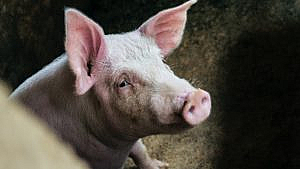Not long ago, I read Babe: The Gallant Pig to my children as part of our ongoing building of a family canon of literature. I remember when the movie adaption came out (I won’t tell how old I was to avoid self-incrimination) and recalled that I had not been impressed at that time. However, in following our standard practice, the movie viewing was proffered following the completion of the reading of the book.
The book being new to me, I found myself delighted by it and enjoying the tale. In brief, a piglet is brought to a sheep farm, where he is ‘adopted’ by a female sheepdog after her own children are given away. While the farmer originally has plans to send the pig to the usual doom of such porcine farm animals, the piglet unexpectedly learns to herd ducks and later sheep after striking up an unlikely friendship with an older ewe.

Throughout, Babe is referred to as ‘pig’ or eventually ‘sheep pig’ in recognition that he has begun to serve in the function and capacity of a sheep dog. The farmer, Mr. Hogget, also recognizes Babe’s value on the farm. I’ll leave the plot there to avoid any spoilers should you not be familiar with the story. However, in the end Babe receives the ultimate commendation of, “That’ll do, pig,” from the farmer, signifying his acceptance as a working animal with a purpose on the farm and approved by his master.
Having been delighted by the book, I looked forward to amending my prior opinion of the movie as often happens when the story is better known (and perhaps with a little less hubris being now a parent rather than a young man). While the movie did have some of the joy of the book, there were a couple of particular additions that changed the nature of the story.
First, Farmer Hogget’s daughter and her family come to the farm with their two utterly spoiled children. During that visit Farmer Hoggett notices Babe’s herding behavior for the first time. After commenting, they engage in the following colloquy:
Son-in-Law: Hey, hey, Dad says his little porker’s a watchpig.
Esme Hoggett: Dearie me! If it’s not a duck that thinks it’s a rooster, it’s a pig that thinks it’s a dog!
Son-in-Law: ‘A pig that thinks it’s a dog’!
This ridicule, both of the pig and of the farmer, sets up a conflict that was real but unspoken in the book. Nonconformance with societal norms necessarily comes with pushback. In the book, and in real life, there is no need to explain the constraints of expectations. Those pressures are perceived and powerful without the requirement that shame be openly heaped on those who dare to violate society’s expectations. In the book, the fear of ridicule is very present in the final scene, but really only as to the farmer. Babe’s freedom to explore a new role as a ‘sheep pig’ garners no overt resistance, just skepticism and lack of support.
Second, the movie inserts a male dog, husband of the female who teaches Babe, who openly resists Babe’s movement into the sphere of the sheepdog. This new character declares to the farm animals, “To each creature its own destiny, and every animal in its proper place. The pig’s proper place is under the old cart, not in the barn, and absolutely never in the house.”
This ultimatum in combination with the human interaction above changes the nature of the conflict. Rather than this story being a conflict of a pig overcoming limitations in his role on the farm, it becomes a question of rules and rebellion. What had been accepted as the standards of behavior when unspoken becomes oppressive and unacceptable when it is spoken. We, the audience, feel keenly the injustice of this external constraint on Babe and his actions rather than simply cheering for him to thrive and grown in an unexpected way.
Paul wrote to the Romans, “The law was brought in so that the trespass might increase. But where sin increased, grace increased all the more,” and “Once I was alive apart from the law; but when the commandment came, sin sprang to life and I died. I found that the very commandment that was intended to bring life actually brought death.” The speaking of the ‘rules’, as viewed by the son-in-law and by the father sheepdog give opportunity to the flesh to rise in rebellion.
It is not unjust to expect a pig to act as a pig. It is not unjust to expect humans to act in a humane manner. By nature we should act according to what we are. Yet rising above these expectations should be celebrated, not derided. It is only the unnatural pursuit of roles that rightly belong to others that is a problem. Had there been a working sheepdog on the farm, it would have been less honorable for Babe to seek that role. But in a vacuum and with the blessing of the aging sheepdog, there was no conflict with one who had a natural right to the task.
In Greek, there are a number of words for ‘good, including some that have to do with the intrinsic beauty or value of something. But the word χρηστός (chréstos) means goodness that has to do with conveying a benefit to others, akin to useful. Even God Himself is described with this word in His conveying good and doing good to His people. Babe’s growth in skill and ability to assist the aging sheepdog and farmer is good in this sense. It is not good intrinsically, but it is good for those around him. This sort of goodness we should celebrate and not restrict.
As a teacher, I expect my students to act as students. I expect propriety, decorum, and diligence. Occasionally, there is a student who rises above and truly acts as a scholar. It would be wrong for me to demean that student if he exceeded his role because his excellence (read: virtue) is of benefit to the whole class and school. It is good. And yet, excelling as a scholar does not convey the privileges accorded to employees and faculty, and the attempt to grasp at it would dishonor the school, the teacher, and the student. The maturity of the student doesn’t negate the proper relationship between teacher and student.
I hope for my students and children to rise up to be more than I, or their peers, ever expected of them. And yet I fear that the spirit of rebellion may tempt them to try cast off their nature while adapting their role. Perhaps they will remember this small lesson from Babe: herd sheep, but remember that you are a pig and not a dog.
Photo by Phoenix Han on Unsplash


